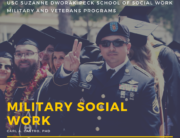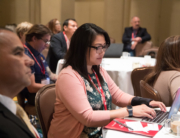by Claudia Bustamante
The University of Southern California has a long history of supporting the United States military—from its days as a training school during World War I to the formation of programs and centers aimed at helping veterans transition home.
Now that tradition continues in the university’s own backyard. Los Angeles Mayor Eric Garcetti recently announced the formation of a new council that will advise his administration on issues affecting the city’s military community.
A majority of the seven-member Military Veteran Advisory Council has ties to the USC School of Social Work, which was the first research university to offer a military social work program that prepares students to care for service members, veterans and their families, helping them cope with the stresses of military life.
Anthony Hassan, director of the USC Center for Innovation and Research on Veterans & Military Families (CIR), is a mayoral appointee on the council.
“Our uniquely high representation on this council is a testament to the strength of the USC School of Social Work and CIR’s standing in the military community,” Hassan said. “We not only provide a great education that produces leaders in this arena, but we are able to bring those leaders together through the Los Angeles Veterans Collaborative to create innovative solutions.”
Hassan’s center aims to strengthen the transition of veterans and military families into civilian communities by conducting – research that informs the Master of Social Work military curriculum, training behavioral health professionals in best practices, and convening community stakeholders, like the Los Angeles Veterans Collaborative.
The collaborative is a group of more than 250 private and nonprofit organizations and representatives that gather to discuss issues affecting local veterans and to coordinate the resolution of gaps in service and needed policy changes.
Longtime members of the collaborative include other council appointees Maribel Marin, executive director of LA County 211; Stephen Peck, MSW ‘97, president and CEO of U.S. VETS; and Stephanie Stone, chief deputy director of the Los Angeles County Department of Military and Veterans Affairs. They have seen the success this collective-impact approach has had on policy.
The collaborative’s working groups—behavioral health, career advancement, families and children, housing and homelessness, legal and reentry, and faith—have successfully consulted on employer training programs; developed a curriculum to train more than 200 clergy ; advocated the Los Angeles Unified School District to identify military children; and launched a large-scale survey to inform data-driven programs and services.
Los Angeles County is home to more veterans than anywhere else in the nation, and their needs are diverse.
“As individual agencies and organizations, we have the ability to interpret information and react quickly. As a collective, we have the ability to have the broader perspective,” Stone said about the benefits of the collaborative.
The council is the latest initiative from the recently established Mayor’s Office of Veterans Affairs, which is placing renewed focus on local military and veteran policies and issues to ensure veterans can access needed services.
Another key person is the city’s veterans affairs coordinator, a new position filled by a USC School of Social Work alumnus and former CIR employee.
Joseph Chicas, MSW ’11, said the education he received at USC helped him understand research, practice and policy, and that working with CIR allowed him to see the real-world applications. Now, in his current role, he is using those skills to improve conditions for the city’s veterans and their families, primarily to tackle unemployment, homelessness and mental health challenges.
“Given that L.A. has had a limited focus on veteran policies, research is the most important tool we can use to design policies that are based on sound evidence and the reality of the needs on the ground,” Chicas said.








